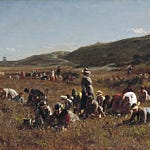We’re extending our 3-year anniversary “forever discount offer” through this week at Word & Song on new paid, gift, and upgraded subscriptions.
Join us!
Talk about the crazy ways a word can take! All the nice distinctions you have to make! It’s enough to slap you silly — and there you go, there’s our Word of the Week: silly. Has anybody ever called you a crackpot? It means you’ve got a crack running someplace along that pot we carry on our shoulders, the head, which may result in some brains leaking out, which is unfortunate, since we’re not blessed with so much of them that we can spare any. But something that’s cracked is crazed: and that’s a phrase you used to hear, describing somebody not right in the head: cracked and crazed, hence crazy, as of glass or porcelain or enamel. Not a nice thing, you say? Well, nice comes from Latin nescius, which means that you don’t know anything; then it came to describe people who are ignorantly fussy or prissy. So when the angel Raphael in Milton’s Paradise Lost, ready to have dinner with Adam and Eve, tells the human couple that the angels enjoy their dinner too, he says that God has bestowed real delights on earth and that they’re new to him. So, he says, “To taste / Think not I shall be nice.” But it went from there to describe a fussiness that isn’t ignorant, as when you have to make a nice distinction; then it described pleasant fashions in ladies’ dress; and now it means that you’ve got a pleasing disposition generally. That’s gone all the way around the bend!
Then we’ve got silly. In German, the same word is selig, blessed. You’ll see it in the Yiddish surnames Selig and Seligmann: if you want to say that the dear departed has entered into blessedness, that will be Seligkeit — as if we were to say in English, sillyhood. Well, in Old English, saelig also meant blessed, happy. There is even a sense of holiness about it: God will bless the faithful soul with gesaelignes, happiness — and sure, that’s a doublet of our word silliness! Now then, think of somebody who is happy, not in the eternal sense but here on earth, and think that he’s so happy, he hasn’t a care in the world, and he expects every day to bring him a lot of fun. Such a blessed fellow earns one of the most delightful adjectives in English: we call him happy-go-lucky! And those two ideas, being happy and being lucky or fortunate, are often closely associated in human languages: German glücklich means both. So did English happy, once upon a time: a happy coincidence is not a cheerful one but a lucky one, one that has happened just right.
Anyway, we see how you can go from blessed, to happy-go-lucky, to simple and innocent. When the Red Cross Knight, in Spenser’s The Faerie Queene, meets a dissembling sorcerer got up in priestly garb, and the knight asks him whether he’s gotten news of any adventure nearby, the old man pretends to be completely out of the way of the world. “Silly old man that lives in hidden cell,” he calls himself, and no, he’d never hear of worldly doings, perish the thought! The word silly there seems to mean innocent, but in a slightly disparaging way. From there, the word lost the full sense of innocence, but kept the sense of being not the brightest bulb in the marquee. “That’s silly!” we say, meaning that it’s nonsense. Still, the word isn’t as harsh as stupid, which carries with it a sense of being stupefied — or “gob-smacked,” as our friends in merry England say. So you’re to blame if you do something stupid, but not necessarily if you do something silly. It’s as if the word could still, now and then, reach all the way back and retrieve something of its old and happy meaning.
I’ve sometimes thought that you could divide the world into two groups: those who are afraid of ever being thought silly, and those who aren’t — and those who aren’t, often go out of their way to be silly so as to make other people laugh. It’s what good Dads learn at Dad School! Don’t get me started with my impersonations, or rolling on the floor being a dog to play with the dog, or tapping into my inner Little Kid to talk to another Little Kid. The world’s got more than enough self-seriousness and stupidity, for sure! A little silliness now and then, of the old-fashioned kind, might do us some good.













